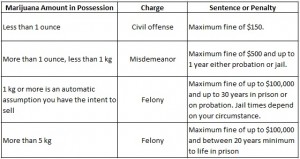ARTICLE OVERVIEW: Marijuana is legal for medical use in Rhode Island. It is still illegal for recreational use but there are efforts being taken towards new legalization.
Table of Contents:
- Is Marijuana Legal?
- CBD Oil
- Laws in Rhode Island
- Penalties
- Marijuana DUI
- Views on Marijuana
- Is Marijuana Addictive?
- Marijuana Treatment
Is Marijuana Legal?
Since 2006, marijuana has been medically legal in the state of Rhode Island under the law called, “Approved Qualifying Debilitating Medical Conditions”[1]. Though there are proposals in the works, Rhode Island continues to view marijuana as illegal for recreational use. In other words, without a proper medical card, being in possession of marijuana is against the law and will result in penalties.
Cannabinoid Oil
The Ocean State legalized cannabinoid oil, known as CBD, back in 2015. Because of its relation to marijuana, there are rules and regulations to be followed when it comes to purchasing and producing cannabinoid products. For example, cannabinoid products are not allowed to have THC content of more than 0.3%.
CBD was made legal to purchase across the nation for two purposes:
- It doesn’t get you high.
- It has many medical benefits.
CBD is the chemical within cannabis plants used to treatmedical conditions such as [2]:
- Anxiety
- Inflammation
- Intractable epilepsy
- Pain
- Psychosis
- Seizures
Marijuana Laws in Rhode Island
As mentioned, marijuana is medically legal and recreationally illegal in Rhode Island. Without a proper medical card, you will face penalties for being in possession of marijuana. However, even with a medical card, there are still rules that you need to follow. [3] These include guidelines such as:
You’re allowed to possess no more around 70 grams at a time.
You may be in possession of up to 12 plants and up to 12 seedlings.
Two or more people with medical cards are allowed to harvest marijuana under the following regulations. Non-residential spaces cannot grow more than 10 ounces of usable marijuana, 48 plants, and 48 seedlings. Residential spaces cannot grow more than 10 ounces of usable marijuana, 24 plants, and 24 seedlings.
The laws for medical marijuana patients work in the same way as recreational alcohol. You are NOT allowed to drive while intoxicated nor consume marijuana in a public place.
Furthermore, people with medical cards are only allowed to legally purchase marijuana through a qualified dispensary. A fellow card holder is allowed to share his or her marijuana with you. S/He is not allowed to sell to you. These rules are an attempt to stop the distribution of illicit substances within the state.
Penalties
Penalties for the possession, sale, or trafficking of marijuana in Rhode Island vary based on your circumstance. For example, if you have over 1 kg of cannabis, you’re automatically considered to have the intent to sell. However, if you have less than 1 kg BUT also have an assortment of selling material like baggies or a scale, you can also be charged with intent to sell. The following table gives you a basic idea of marijuana possession laws and penalties within the state of Rhode Island.

Again, these laws vary depending on your situation. For example, if you’re caught selling within 300 yards of a school, all penalties automatically double. If you’re caught selling to a minor, you receive a minimum fine of $10,000 along with a minimum sentence of 2 to 5 years.
Marijuana DUI
DUI laws for marijuana in Rhode Island work like the laws set up for drunk driving. The only huge difference is you can be charged more for possession of marijuana on top of your DUI. [4] Furthermore, the charges you receive will depend on your circumstance. For example, if you have a child in the car while driving under the influence of marijuana, you can expect to be face more penalties.
The following are offenses with the general penalties involved with them. Understand, you can receive more or less of a consequence, depending on your situation.
- First Offense
○ Up to one year in jail.
○ Suspended license for 3 to 12 months.
○ Fines of up to $800.
○ 10 to 60 hours of community services.
○ Driving school.
- Second Offense
○ Minimum 10 day jail sentence, maximum 1 year.
○ Suspended license for 1 to 2 years.
○ Mandatory drug treatment.
○ Fines of up to $1,500.
- Third Offense
○ Minimum 3 year jail sentence, maximum 5 years.
○ 3 years of license suspension.
○ Mandatory drug treatment.
○ Fines of up to $5,000.
If somebody was INJURED or KILLED due to your DUI, the penalties will be much greater. It’s common for these situations to bring upon felony charges, especially if your DUI causes a fatality. You’ll automatically be charged with vehicular manslaughter and can face upwards of life in prison.
Views on Marijuana
Currently, at the time of writing, marijuana advocates are taking action to legalize marijuana in the state of Rhode Island. With fellow New England states Vermont, Massachusetts, and Maine already allowing recreational cannabis, it wouldn’t be surprising if Rhode Island joined in too. In fact, a recent public opinion poll found that more people in Rhode Island favor legalization than discourage it. [6]
With this in mind, the laws mentioned throughout this article may change in the near future. However, as is currently happening with legal states, rules and regulations surrounding cannabis is constantly changing. Therefore, the future of its legal status within the state and how it’ll be regulated remains a question up for debate.
Is Marijuana Addictive?
There are many out there who will tell you marijuana isn’t addictive. The unfortunate truth is, they’re absolutely wrong! Marijuana contains addictive qualities in a similar way to other drugs. People who smoke cannabis usually are addicted to its psychoactive elements and use the drug for mental and emotional reasons.
You know marijuana causes a dependence because when a chronic user suddenly stops, they experience withdrawals. This is when the body begins to need marijuana in order to function normally. When marijuana is suddenly taken out of the system or when a high begins to wear off, you may feel the following:
- Anger
- Anxiety
- Depression
- Difficulty concentrating
- Irritability
- Mood changes
- Trouble sleeping
People also use marijuana for a lot of physical reasons as well. Some smokers will tell you they need marijuana in order to sleep properly. Or they have trouble maintaining an appetite without it. This is due to the fact that the body has adjusted to marijuana. Physical addiction can cause the following in individuals:
- Aggression
- Cravings
- Difficulty falling asleep
- Insomnia
- Loss of appetite
- Raise in body temperature
- Restlessness
- Sweating
If you or anyone you love is currently struggling with a marijuana addiction, we can help. Our American Addiction Center hotline operators can walk you through the treatment process and answer any questions you may have.
You are not alone.
If you want to quit, reach out for help today.
Marijuana Treatment
Since marijuana affects people differently, treatment also needs to be individualize. Marijuana affects a person’s psychology and, therefore, treatment tends to focus on talk therapies. [5] The mental reasons we use marijuana are often very personal and need to be identified on an equally personal level.
Keep in mind that a treatment facility should be customized to your needs rather than vice versa. Depending on where you go, the way in which the facility goes about treatment may differ. However, most reputable facilities will offer similar steps during treatment. These include:
1. Medical Assessment
A reputable rehab follows protocol and first offers patients a complete medical evaluation upon intake. This will involve drug tests, interviews, and a full medical and family history. This data is neededin order to discover the best course of treatment for you.
2. Detox
People go through detox when withdrawal symptoms are very strong and require medical supervision. Since marijuana’s physical withdrawals usually aren’t strong, you might not need to go through this step. Chronic smokers and those who use marijuana with other drugs can benefit from detox to flush out their system.
3. Psychological Treatment
When it comes to treatment, counseling is the most important step. Many people use cannabis as a means of relieving emotional stress or handling day-to-day life. The goal of psychological treatment is to change your thoughts, patterns, and beliefs. As mentioned, talk therapy is often the most common and effective therapy option when it comes to marijuana. This therapy will be a combination of individual and group counseling.
4. Educational Sessions
During treatment, it’s important to be enrolled in educational sessions which teach you about addiction. Learning about how drugs affect the brain can help you stay away from them in the future! The importance of this is to make you aware of the dangers and penalties which can arise through an addiction. It also hopes to prevent you from relapse.
5. Supportive Services
Most treatment facilities off supportive services. These include vocational training, housing assistance, financial assistance, legal assistance, and medical assistance. Not everyone will need this kind of help, but it should be in place.
Your Questions
Still have questions about weed in RI? If you have any further questions pertaining to marijuana laws in the state of Rhode Island or marijuana addiction and treatment, we invite you to ask them below.
If you have any advice or information to share on these topics, we’d also love to hear from you. We try to reply to each comment in a prompt and personal manner.









Related Posts